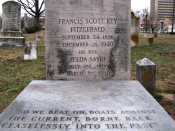The Linguistic Style of F. Scott Fitzgerald in The Great Gatsby
As The New Lexicon Webster's Dictionary of the English Language tells us, linguistics is the scientific study of language or languages whether from a historical and comparative (diachronic) or from a descriptive, structural (synchronic) point of view. Linguistics is concerned with the system of sounds of language; for example, sound change (phonology), its inflections and word formation (morphology), its sentence structure (syntax), and its meaning changes (semantics), as well as other minor features such as grammar and spelling. Linguistic style is what helps to separate one author's literary work from anyone else's; it is the cornerstone of what makes an author's work unique and interesting.
When discussing any of F. Scott Fitzgerald's many works, one must first consider his infatuation with all things outwardly beautiful, but inherently flawed. In such pieces as "Winter Dreams" and This Side Of Paradise, Fitzgerald turns a scrutinizing eye towards the glamorous decadence of circa 1920's America, where young "flappers" would bounce from social situation to social situation, looking for the ultimate good time.
While many of these socialites were blessed with the financial capacity to stay out all hours of the night party-going and drinking, on the outskirts of this subculture were those who only longed to truly be a part of the "in-crowd." These were people like Fitzgerald himself: upper-middle class citizens who worked the day away, frittering away their hard-earned money on trinkets and status symbols, so that by night, they could briefly mingle with the ranks of the "beautiful people." These people were possessed with an almost unnatural drive to "keep up with the Joneses;" to dedicate their lives to looking much better of than they actually ever could be. These types of characters were Fitzgerald's favorite to use...



Good
this helped me get a couple more ideas and also helped put the story into prepective.. thanks
2 out of 3 people found this comment useful.